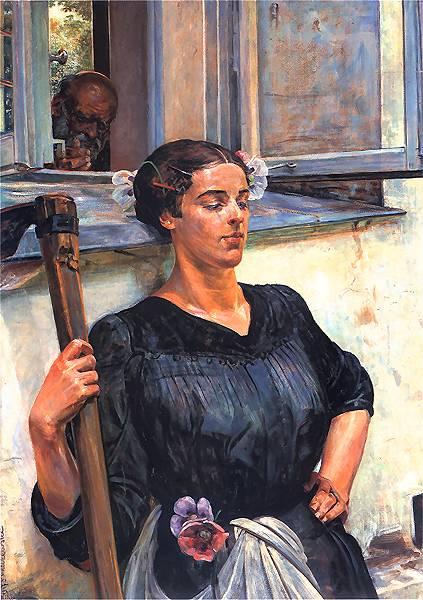Description
The work "death" of Jacek Malczewski, created in 1917, is erected as a deep reflection of the existential concerns of his time, a time marked by suffering and transformation, particularly influenced by the historical context of the First World War. As one of the main exponents of symbolism in Poland, Malczewski uses its characteristic visionary approach to capture the inevitable relationship between life and death, using a rich iconography that arouses the interest and reflection of the viewer.
The "death" composition is amazingly articulated; The canvas, focused on a female figure that represents death, acquires an almost monumental character. The figure, which stands out for its presence, is dressed in a mantle that flows and wades in the air, surrounded by symbolic elements that generate an enigma atmosphere. Malczewski plays with the idea of movement and stillness, creating a contrast between the dynamic death figure and the most serene background. The choice of a natural environment suggests the constant struggle between the cycles of life and the inevitability of death. The harmony of elements in the background is contrasted to the urgency of the message that the central figure transmits.
The use of color is another aspect that stands out in this painting. Malczewski uses a rich and nuanced palette that goes from gold to the dark, creating a visual effect in which color seems to vibrate with its own energy. The deep shadows add a sense of drama, while the light tones in the mantle of the figure invite contemplation. The interaction between the clear and the dark not only establishes a game of lights that models space, but also symbolizes the duality of life and death.
The figure of death sometimes evokes a sense of tenderness, which is an intriguing choice by the artist; Far from being a chilling representation, death can be interpreted here as an integral part of the natural cycle. The contemplation and serenity of the figure can invite a reflection on the end of life not as a tragedy, but as a transit towards another form of existence. This resonates deeply in the context of symbolism, where it is sought beyond mere representation, trying to capture the essence of what human experience can be.
In the tradition of symbolism, Malczewski also fuses his Polish cultural heritage with influences of European art, something remarkable in his technique and in the symbolism present in his work. His collective work often explores identity, tradition and spirituality issues, becoming a vehicle to express broader and more universal concerns. As in other works that deal with suffering and transcendence, "death" is not limited to a mere portrait of a terrifying figure, but also addresses universal issues that resonate over time.
As "death" of Jacek Malczewski is observed, one cannot avoid feeling attracted to the deep emotional connection it evokes. His ability to merge a gloomy message with a technically impressive execution reinforces the relevance of Malczewski within the Canon of Polish and European art. The work is not only a visual exploration of mortality, but also a philosophical dialogue that invites reflection and introspection, characteristics inherent in the identity of the symbolism that the artist embraced with sophistication and originality. On this canvas, the viewer faces not only death, but to life itself, its nuances and beauty that can be found even in the ephemeral.
KUADROS ©, a famous paint on your wall.
Hand-made oil painting reproductions, with the quality of professional artists and the distinctive seal of KUADROS ©.
Art reproduction service with satisfaction guarantee. If you are not completely satisfied with the replica of your painting, we refund your money 100%.

